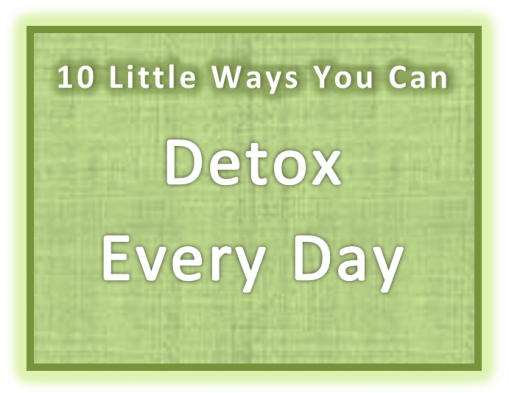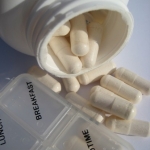Detox Every Day 5: Get Off Your Butt
move your body, move those toxins

If you want toxins to move out of your body, you gotta, well, move your body. Almost all detox regimens call for exercise because physical activity mobilizes the toxins in your body like nothing else – there is no substitute for exercise. Below are just a few ways that exercise stimulates detoxification.
Exercise increases circulation.
Physical activity gets both your blood and your lymph moving. This will spill over to improving blood flow through the liver, your body’s detox headquarters. More blood travels to the skin during exercise, carrying toxins that can leave the body through the skin (particularly through sweat). The increase in circulation helps to move toxins that have been released from your fat stores to where they need to go: out.
Exercise works up a sweat.
Sweat is the primary way our body excretes toxins through the skin. A lot of studies have been done, showing exactly what kinds of toxins can be excreted in the sweat; everything from insecticides, pesticides, toxic heavy metals, flame retardants, and even phthalate plastic residues. You need to work up a sweat to obtain the detox benefits of exercise. If you’re not sweating, consider the intensity of your work out. Is it too easy? Is it too short? If it’s not easy and it’s not short, and you’re still not sweating, consider adding a few layers of clothing during your workout. Otherwise, you may need to see a healthcare practitioner to check out your lack of sweat.

Exercise burns fat.
Fat soluble toxins (if it’s not fat soluble, its water soluble) are like magnets to your fatty stores. They love to hang out there. Want to kick them out? Exercise. Because exercise burns up fat, the toxins stored in fat get released when the fat no longer provides them a home. Aerobic exercise 1-2 times a day for about 20-30 minutes in duration is enough to stimulate the mobilization of toxins from your fatty stores.1
Exercise speeds up your metabolism.
If it speeds up your metabolism, it’ll speed up all the metabolic processes in your body – and detoxification is one of them. Plus, if it speeds up your metabolism, it’ll help to keep your fatty stores at bay (the less fat you have today, the less toxins you store tomorrow).
Exercise helps you poop.
During exercise, digestion is slowed down. This occurs because the sympathetic nervous system is in charge of exercise, and it is the opposite counterpart that regulates digestion (parasympathetic nervous system): they can’t operate at the same time. However, your body has an adaptive response to exercise that results in improved motility and elimination through your digestive tract. Because exercise helps you poop, it’s facilitating the removal of toxins through this route.
Resources:
1. Hibbs, John. Class Lecture. Environmental Medicine. Bastyr University. Winter 2009.
2. Piscopo G, Yarnell E. Naturopathic Basic Science Study Manual. Healing Mountain Publishing Inc., 2008.
Enjoy More Archerfriendliness
I've been prescribing this tea for my patients and I recently tested it on myself. It works, and it works well! I'm tempted to give you a disclaimer for it being so...simple. There are a whole bu...
After I graduate and pass my board exams, I will be licensed to prescribe an antibiotic, zap a skin tag, stitch up a bloody laceration, administer nutrients intravenously, draw blood, freeze a war...
When I was in middle school, boxers were cool and briefs were dorky. I was a 12 year old, sheltered church girl. What did I know about men's underwear? Well, I knew that my (step) dad wore brie...







